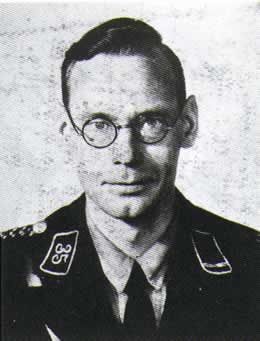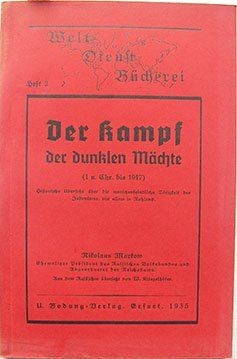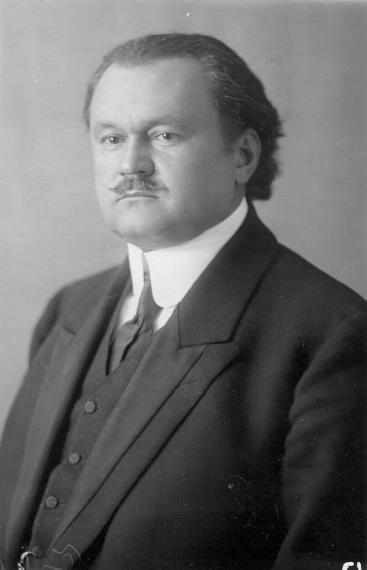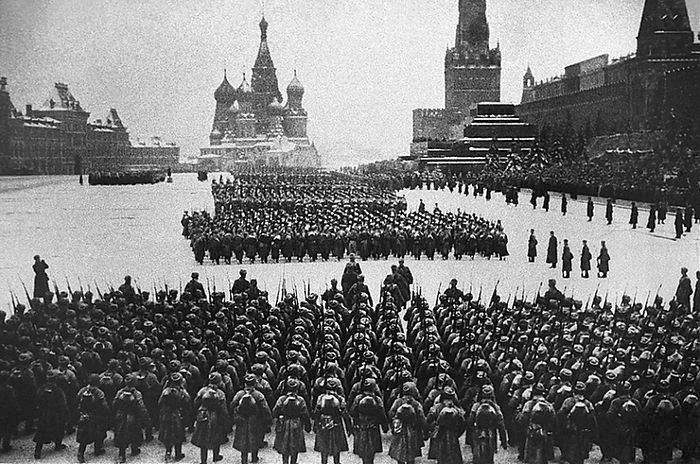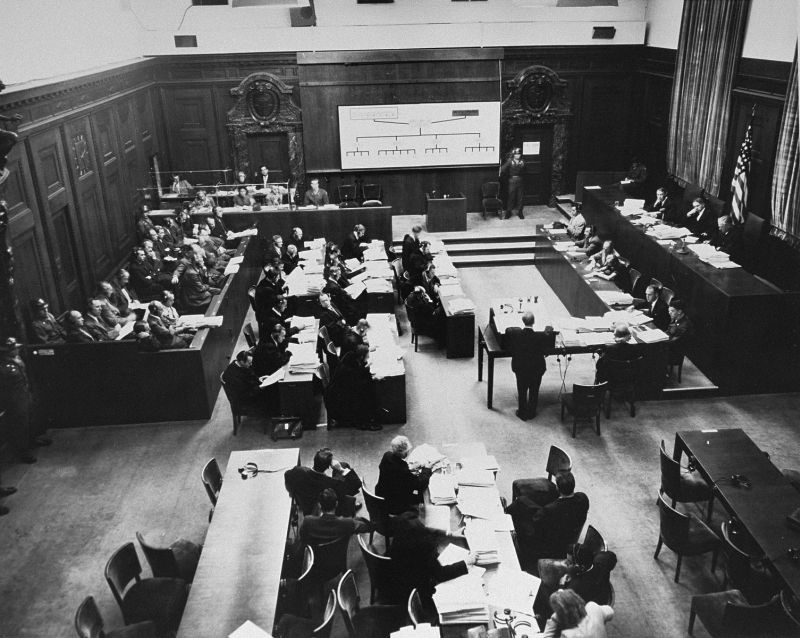Introduction
From 15 September 1947 to 10 April 1948, 24 men stood trial in Nuremberg for the crimes they committed as leaders of the Einsatzgruppen. These units of the SS had carried out mass executions on the Eastern Front on a large scale from 1941 onwards. Their victims were 'enemies' of the Empire, especially Jews, both adult men and women and children. Different levels of education and professions were represented among the accused in Nuremberg. The majority had received legal training, but they also included a dentist, an architect, and a refrigerator salesman. The most notable professional background was that of Woldemar Klingelhöfer. He had worked as an opera singer before the war. This article attempts to find an explanation for his remarkable path in life, which took him from the concert hall to the killing fields of the Eastern Front.
Childhood years
When Woldemar Karl Julius Nikolai Klingelhöfer was born in Moscow on April 4, 1900, Czar Nicholas II was still in power in Russia. In the future capital, the Klingelhöfer family was part of the German community. Woldemar was one of the three children of cemetery director Hans Klingelhöfer and his wife Toni Klingelhöfer Tölke. During the First World War, Russia fought alongside the Allies, and in 1915 the Klingelhöfer family was exiled for their hostile German ancestry. Troubled years followed for Russia. The Russian Revolution led to the abdication of the czar in 1917 and the creation of the communist-controlled Soviet Union in 1922. The Klingelhöfers watched with regret from Germany how the Russia they knew changed forever. In April 1915, the family had settled in Kassel, where Woldemar continued his secondary education. In Moscow he had attended the German gymnasium associated with the Peter-und-Paul-Kirche and in Kassel he studied at the Wilhemsgymnasium where he graduated in 1919.
Klingelhöfers study was briefly interrupted by service in the Imperial Army. From June 29, 1918, to December 7, 1918, he was part of the 11. Pionier Ersatz Bataillon in the rank of Pioneer. He was stationed in Silesia and spent the last months of the war in a non-combatant role. The gruesome experiences of the soldiers in the trenches thus passed him by, but the German defeat of 11 November must have been a shocking experience for him as a nationalist German. His nationalist spirit emerged after the war through his affiliation with the Offiziers-Kompanie Kassel, a paramilitary unit made up of former soldiers, which was used by the government in Kassel to fight communist groups in the tumultuous years 1918-1920. Klingelhöfer claims that in 1919 he was involved in the repression of strikes and communist uprisings in Thuringia within this Freikorps. Until 1923, he was also a member of the Jungdeutsche Orden, a paramilitary youth movement inspired by the Teutonic Order. From 5 June to 24 July, 1921, he was also part of the Selbstschutz-Bataillon Wolf, a unit of armed civil defense in Upper Silesia. He was awarded the Schlesischer Adler II for his efforts within the battalion.
Opera singer and SS officer
While the German political climate became calmer during the 1920s, Klingelhöfer devoted himself to a singing career. He took singing lessons at the college in Kassel and then in Berlin. In 1924, he spent three quarters of a year working as an apprentice on a bank in Kassel to finance his studies. In 1924 and 1925 he travelled the country with a company as a concert singer. He then continued his studies to obtain the state diploma for singing teacher in 1928. Although he no longer took an active part in the political struggle, in 1929 and 1930 he did translate into German a political book written in Russian, titled "Der Kampf der dunklen Mächte" (The Battle of the Dark Powers). This anti-Semitic publication was written by the right-nationalist Russian politician Nikolai Yevgenyevich Markov, who was a member of the State Duma and from 1910 to 1917 and headed the monarchist, ultra-right political party CPH (Union of the Russian People). The book was a discourse on the "hostilities against humanity of Judaism, especially in Russia" from the year 0 to 1917. It also opposed the alleged undermining influence of Freemasonry on Russian society. After the October Revolution of 1917 in his homeland, Markov emigrated to Germany, where he would become a supporter of the Nazis and where his book translated by Klingelhöfer was published in 1935. On 25 April 1945 he died in Wiesbaden at the age of 79.
In 1929 Klingelhöfer became a German citizen. From August 1932 to January 1933 he was again associated with a travelling company as an opera singer. On a private level he was married to Adele Reetze from Koburg, born on October 14, 1899, with whom he would have four children: three boys and a girl. All these personal details - plus his height of 1.81 meters, shoe size 42½ and head size of 22 inches (56 cm) - were carefully noted in his SS personnel file. Already in the summer of 1932 he had registered with the SS, at the SS-Sturm 7 / I / 35 in Kassel, but his work as a travelling opera singer had intervened. After his return to Kassel in January 1933, he applied again, after which he was admitted to the Allgemeine-SS on 1 February 1933 as SS-Anwärter (prospective member) with membership number 52.744. With his "predominantly Nordic" descent and "soldierly" personality he met the admission requirements. On 30 November 1934 he was taken into paid employment. In the same year he was transferred to Sturm 1/I/35. Earlier, on June 1, 1930, he joined the NSDAP with lot number 258.951. According to his own words he joined the Nazi party to fight Bolshevism.
With the SD
After a permanent employment as an opera singer at the State Opera of Kassel in 1933 and 1934 Klingelhöfer had to give up his singing career because of voice problems. On the advice of a friend, he applied at the Sicherheitsdienst (SD) in Kassel. Although he had no experience whatsoever with intelligence and security matters, with his higher education, knowledge of the Russian language and political conviction, made him a useful candidate for the organization, which after Hitler's seizure of power in January 1933, was among other things engaged in gathering information about political opponents at home and abroad. At the beginning of 1935, he was accepted by the SD in Kassel. Because of "his previous education and versatile talent" he was "employable in most areas of the SD", according to a note in his personnel file. In line with the subject of the book he translated, he was to lead the Department of Freemasonry and Marxism until June 1, 1936. During this time, he developed into one of the best praised and most reliable collaborators, which is why the leader of the bureau could appoint him as his deputy in his absence.
Klingelhöfer was promoted in the form of his appointment as head of Section II/2 in Kassel (Deutsche Lebensgebiete), which dealt with domestic affairs. "He managed the division with great thoughtfulness, experience and skill", according to his assessment. "K. is an open, honest and trustworthy personality. He maintains a strong companionate relationship with his associates." In terms of political color and worldview, he was certainly considered trustworthy. A plus for the anti-religious SS was that he had left the Evangelical Church, as he reported on June 17, 1937. From then onwards, he declared that he did not belong to any religion and called himself Gottglaubig a euphemism of the Nazis for people who had left the church. In 1938, it was established that he had no "notable tendencies and weaknesses," such as alcoholism, which meant that nothing stood in the way of his career. In 1937, he was appointed leader of Section III C Kultur (Culture). In line with his career leaps within the Kassel SD, he was promoted in rank several times from 1935 to 1941: from Unterscharführer on 15 February 1935 to Sturmbannführer on 3 January 1941. The only drawback that Klingelhöfer repeatedly had to explain to his superiors was that he was not in the possession of the SA-Sportabzeichen. Obtaining this sports medal was not possible for him, because his doctor had forbidden him from all sports movement after severe pleurisy.
Definitielijst
- First World War
- Took place from 1914 till 1918 and is also named The Great War. The conflict started because of increased nationalism, militarism and neo-colonialism in Europe. Two alliances battled one another during the 4-year war, which after a dynamic start, resulted into static trench warfare. The belligerents were the Triple Alliance (consisting of Great-Britain, France, and Russia; later enlarged by Italy and the USA, amongst others) on the one hand and the Central Powers (consisting of Germany, Austria-Hungary, Bulgaria and the Ottoman empire) on the other hand. The war was characterized by the huge number of casualties and the use of many new weapons (flamethrowers, aircraft, poison gas, tanks). The war ended in 1918 when Germany and its allies surrendered unconditionally.
- Freikorps
- German paramilitary units established directly after the Great War by former front soldiers. These groups were often named after their commander. Freikorps formed the basis of the eventual SA or Sturmabteilung.
- Jews
- Middle Eastern people with own religion that lived in Palestine. They distinguished themselves by their strong monotheism and the strict observance of the Law and tradition. During World War 2 the Jewish people were ruthlessly persecuted and annihilated by the German Nazis. . An estimated 6,000,000 Jews were exterminated.
- Judaism
- Monotheistic religion developed among the ancient Hebrews.
- Nazi
- Abbreviation of a national socialist.
- Revolution
- Usually sudden and violent reversal of existing (political) the political set-up and situations.
- Sicherheitsdienst (SD)
- The national socialistic intelligence and counterespionage service of the SS.
- Soviet Union
- Soviet Russia, alternative name for the USSR.
- ultra
- British intelligence service during World War 2
Second World War
On the Eastern Front
Shortly after the outbreak of the Second World War on September 1, 1939, the Sicherheitsdienst was incorporated into the newly founded Reichssicherheitshauptamt (Main Office of State Security). Klingelhöfer was henceforth working for this so-called RSHA. In Kassel, until May 1941, he was in charge of a department of the SD, which was occupied with probing the mood of the local population towards the war and the government and its propaganda. During the war, this population survey was one of the most important internal activities of the SD and was an important source of information for the Nazi leadership. Klingelhöfer had to stop this work when the RSHA recruited him for the Einsatzgruppen (Special Action Squids), units consisting of men of different SS disciplines who would perform "security tasks" in the area directly behind the front during the invasion of the Soviet Union. An important task was to execute communist leaders, partisans, saboteurs and other hostile elements. Initially this included only male Jews, but already after about eight weeks, entire Jewish communities were exterminated by the four Einsatzgruppen, each assigned to a separate part of the front.
Klingelhöfer was part of Einsatzgruppe B which was led from 22 June to the end of October 1941 by SS-Brigadeführer und Generalmajor der Polizei Arthur Nebe. The unit operated in Belarus and the Smolensk region and was subordinate to Heeresgruppe Mitte (Army group Center). On 14 November 1941, it was reported to Berlin that the total number of liquidations registered by Einsatzgruppe B, at that time, was 45,467. Klingelhöfer was initially assigned as interpreter to Sonderkommando 7b, one of the five sub-units of Einsatzgruppe B. After Nebe established his headquarters in Minsk for a month on 5 July, Klingelhöfer was transferred to Sonderkommando 7c, better known as Vorkommando Moskau. In August 1941, he took command of the unit to replace Franz Six. This unit's task was to cleanse Moscow and its surroundings of Jews and other "enemies of the Empire". However, the Vorkommando never reached Moscow, because the offensive launched on October 2, 1941 by the German army on the Russian capital, Operation Typhoon, failed. During the time Klingelhöfer was in command of the unit, it liquidated thousands of people, which was reported in reports sent to RSHA headquarters.
It has not been proven that Klingelhöfer personally ordered all executions or that he was always present. During interrogations prior to the post-war trial against him and other leaders of the Einsatzgruppen, he admitted that he was at least briefly present at an execution in Mstsislaw in Belarus. In his own words, Nebe had ordered this execution because the men of the Einsatzgruppen were in need of fur coats and other winter clothing taken from the executed Jew. Klingelhöfer said that he watched ten Jews being shot on the edge of a mass grave. He himself claimed not to have been involved and shifted the blame to a colleague, an SS-Hauptsturmführer of the Kriminalpolizei. However, he did admit that, that autumn he had ordered the arrest of 200 Jews in Tatarsk, also in Belarus. Of these, he had 30 to 50 men executed because they had left the ghetto without permission and would have joined partisans in the forest. Three women were also said to have been executed for contact with partisans. They were given a blindfold for compassionate execution and were buried separately. Klingelhöfer was ordered to carry out this execution by Nebe and according to him it was necessary to secure the area behind the front. It was this security excuse that was systematically used by the SS on the Eastern Front to justify the murder of innocent civilians.
As captain of a unit devoted to executions and the "pacification" of conquered territories, Klingelhöfer seemed an odd man out with his profession as an opera singer. However, many other leaders of the Einsatzgruppen also had no background within the police or the military. The majority were higher educated and various professional groups were represented, although lawyers were in the majority. It was therefore not Klingelhöfer's singing career that recruited him, but his political reliability and track record within the SD combined with his knowledge of the Russian language and culture. Ethnic Germans (called Volksgermane by the Nazis) like him were over-represented among Holocaust perpetrators, according to a study by sociologist Michael Mann. While they made up 1% of the total German population, they accounted for 6% of the perpetrators. The fact that Klingelhöfer was born in Moscow and that he had translated Markov's book, probably put him in the spotlight when the leaders were appointed for the Einsatzgruppen. His good reputation within the SD in Kassel did the rest.
Transfer to Minsk
After a short holiday, Klingelhöfer was transferred to the headquarters of Einsatzgruppe B in Smolensk on 20 December 1941. Although it did not look like a German conquest of Moscow was imminent after all, he worked here on the translation of captured documents within the framework of the Einsatz Plan Moskau, a plan detailing what the SS's duties would be when the city and its administration were captured. The unrealistic plan could disappear in a filing cabinet when Klingelhöfer was transferred to the headquarters of the commander of the SD and Sicherheitspolizei in Minsk in September 1943. The exact work he carried out here is not known, but at this time something happened that was a blemish on Klingelhöfer's otherwise so clean blazon within the SS. The matter related to the charge that during his time in Minsk he unlawfully appropriated two pairs of women's shoes from the storage of the SD, one pair for his wife and the other for the wife of a colleague. Nowhere in the court documents is there any mention of who the shoes originally belonged to, but it is plausible that the former wearers were Jewish women who had been executed.
Within an organization like the SS that was guilty of mass murder and looting on a large scale, the unlawful appropriation of two pairs of shoes seems a futility. As if there weren't any greater concerns given the appalling situation on the German front in 1944. However, SS leader Heinrich Himmler weighed heavily on the reliability of his men, even though corruption was commonplace within his organization. For Klingelhöfer it all ended with a sizzle. It is true that at the time the shoes were handed over to him by a Jewish camp employee, he had not yet received permission for this, but he would have reported the receipt to the camp administrator afterwards.The SS court pointed out that he should have asked for permission before taking the shoes with him. However, because these were 'comparatively low-value cases', prosecution was not deemed necessary. However, a disciplinary sanction was not ruled out as Klingelhöfer was 'obliged by his rank and position to behave in an exceptionally correct manner and the appearance of wanting to enrich himself at the expense of State property should also be avoided'. Whether Klingelhöfer was actually disciplined is not mentioned in his personnel file. His acquittal from prosecution was confirmed by Heinrich Himmler on 9 August 1944.
Zeppelin
When exactly Klingelhöfer returned from the Eastern Front is unclear, but from January 1944 he worked in Germany within the organization of Unternehmen Zeppelin (operation Zeppelin), which was part of the department C (Russian-Japanese sphere of influence) of Amt VI (SD-Ausland) belonging to the RSHA. The operation, whose headquarters were located in the Wannsee district of Berlin, had started around 1942/1943 and had both an intelligence as well as a sabotage component. The idea was to recruit Soviet soldiers in German POW camps, who after a training period in speciasl camps would be dropped behind the Soviet front by parachutes to carry out sabotage and counter-espionage missions. It was a large-scale operation: at one point there were about 10,000 to 15,000 volunteers in the camps and 2,000 to 3,000 were ready for deployment. Among them were various nationalities, including Turkmenians, Caucasians and Georgians, who didn't like the Soviet regime. Most of the volunteers would never be deployed due to a shortage of planes, radios and parachutes. A maximum of 2,000 agents were dropped behind enemy lines by Zeppelin and the Abwehr (the military intelligence service led by Admiral Wilhelm Canaris) in the Soviet Union.
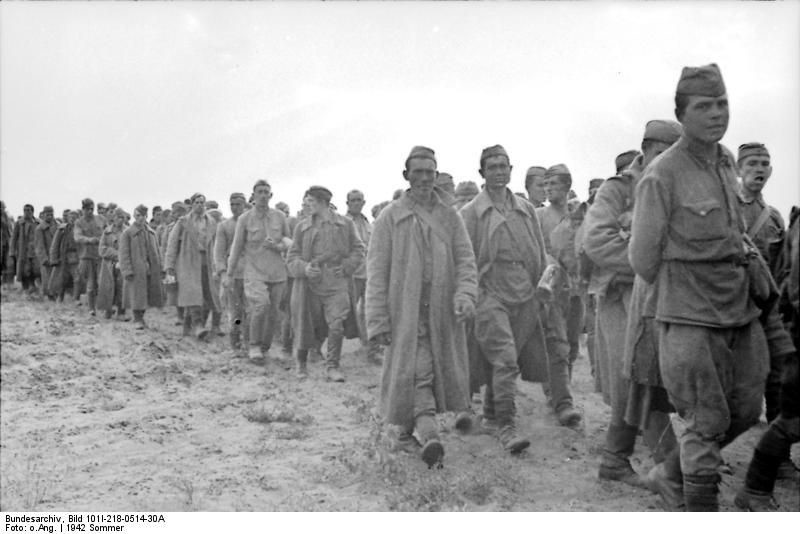
Soviet prisoners of war in 1942. The purpose of Operation Zeppelin was to recruit men like these for sabotage and intelligence missions. Source: Bundesarchiv, Bild 101I-218-0514-30A / CC-BY-SA 3.0
Klingelhöfer was put in charge of Sonderlager L, one of the camps of Operation Zeppelin, which was located in Blamau in the east of Austria. It was a continuation of Sonderlager T in the Polish town of Wroclaw, which was closed due to the advance of the Red Army. The Klingelhöfer-led camp housed Soviet engineers and technicians who volunteered to share their knowledge with the Germans. Unlike in German POW camps they stayed here under good conditions. In the camp valuable statistics, maps, graphs and other information were collected and evaluated on, among other things, tank production, food supply, natural resources and communication systems in the Soviet Union. For the benefit of the research, the captured library collection of the Kiev Technical College was transferred to the camp in eight truckloads. Cooperation included moving the Wannsee institute, a research institute of the SD for political, economic and administrative issues, from Berlin to Castle Plankenwarth in Austria. According to the British historian Perry Biddiscombe, Sonderlager L was the most successful part of Operation Zeppelin, although the knowledge gathered in the camp could never be put into practice because of the German defeats on the Eastern Front.
Definitielijst
- Abwehr
- Term used for the German military intelligence unit during the WW1 and WW2. From 1935 onwards under command of Admiral Wilhelm Canaris. The organisation often came into conflict with other secret services such as the SD and the Gestapo. During World War 2 under Canaris frequently a source for conspiracies against the Nazi regime until in 1943 a major conspiracy by a number of prominent members of the Abwehr was discovered and the Abwehr was placed under command of Himmler. After the assassination attempt on Hitler in 1944, Canaris was discharged and the Abwehr was dissolved. The conspirators and Canaris were prosecuted and in 1945 they were executed atc oncentration camp Flossenburg.
- Einsatzgruppen
- "Taskforces of Deployment Squads". Special units composed of various SS and police services under supervision of the Reichssicherheitshauptamt (RSHA). Einsatzgruppen were deployed during the invasion of Poland in 1939 and during operation Barbarossa in 1941. In 1939 these units were ordered to eliminate the Polish intelligentsia. In the Soviet Union they were deployed to execute various political and racial enemies of the Third Reich, like Jews, gypsies and communists. The "Holocaust by bullets" in the Soviet Union was the horrendous first act of the eventual "final solution".
- ghetto
- Part of a town separated from the outside world to segregate Jewish population. The establishment of ghettos was intended to exclude the Jews from daily life and from the rest of the people. From these ghettos it was also easier to deport the Jews to the concentration and extermination camps. Also known as “Judenviertel” or Jewish quarter.
- Heeresgruppe
- The largest German ground formation and was directly subordinate to the OKH. Mainly consisting of a number of “Armeen” with few directly subordinate other units. A Heeresgruppe operated in a large area and could number several 100,000 men.
- Holocaust
- Term for the destruction of European Jewry by the Nazis. Holokauston is the Greek term for a completely burnt sacrifice.
- invasion
- Armed incursion.
- Jews
- Middle Eastern people with own religion that lived in Palestine. They distinguished themselves by their strong monotheism and the strict observance of the Law and tradition. During World War 2 the Jewish people were ruthlessly persecuted and annihilated by the German Nazis. . An estimated 6,000,000 Jews were exterminated.
- Nazi
- Abbreviation of a national socialist.
- offensive
- Attack on a smaller or larger scale.
- POW
- Prisoner of War.
- propaganda
- Often misleading information used to gain support among supporters or to gain support. Often used to accomplish ideas and political goals.
- Red Army
- Army of the Soviet Union.
- RSHA
- Reichssicherheitshauptamt. The central information and security service of the Third Reich.
- Soviet Union
- Soviet Russia, alternative name for the USSR.
Conviction in Nuremberg
Arrest and suicide attempt
Klingelhöfer experienced the downfall of the Third Reich in the Alpenfestung (Alpine Fortress) in the Austrian Alps. However, this last Nazi resistance stronghold would surrender to the Allies largely without a fight. However, after the German capitulation on 8 May it would take until 20 October 1945 before Klingelhöfer surrendered to the British. First he brought his wife and children, presumably from Austria, back to Kassel. He had his sick little daughter admitted to the Evangelical hospital Bethel in Bielefeld. After he reported to the British, he was imprisoned in Bielefeld. He would be imprisoned here until June 1947, after which he was transferred to the prison in Landsberg for interrogation prior to the Einsatzgruppen trial, in which he was one of the defendants. This tribunal took place from 15 September 1947 to 10 April 1948 in Nuremberg and was the ninth of a total of twelve trials that followed the great Nuremberg Trial against the Nazi leaders. The hearings were held in the same courtroom in which the members of the Nazi leaders had previously stood trial before the International Military Tribunal, but this time the tribunal was not jointly organized by the four main Allied forces, but only by the Americans. The 24 defendants were all senior officers of the Einsatzgruppen. They were accused of crimes against humanity, war crimes and membership of criminal organizations.
During the preliminary interrogations Klingelhöfer made an uncertain impression. On the one hand he confessed, for example, to having ordered the execution of the escaped men from the Tatarsk ghetto, but on the other hand he claimed that he had no managerial role and had only been active as an interpreter and translator within Einsatzgruppe B. The man who only had a note in his SS personnel file because of the wrongful appropriation of two pairs of shoes, found it difficult to assert himself when confronted with the large-scale crimes for which he and his colleagues were held responsible. On the one hand he wanted to be honest and sincere, but on the other hand he did not want to burden himself. This led to an inner struggle. Five days after he was officially indicted on July 1, 1947, he attempted suicide in his cell. On the morning of July 6, his cell mate found him in a pool of blood. According to the doctor on duty Klingelhöfer had made a deep hole in the vein of his left wrist. He had used a large safety pin for this, which is still kept today by the National Archives in Washington. Although he had lost a lot of blood, he could be saved.
Benjamin Ferencz, the U.S. chief prosecutor in the Einsatzgruppen trial, believed that Klingelhöfer's suicide attempt stemmed from repentance for his role in Nazi crimes. "Unfortunately, too late after the collapse, I gained full insight into the total extent of the horrific blasphemy that was being carried out here," Klingelhöfer himself wrote about this in a repentant suicide note. "Nevertheless, I ask that this suicide attempt of mine should not be regarded as an attempt to excuse myself in any way. I am fully aware of the fact that I have to bear the consequences for my personal attitude and actions. In spite of this, I do not want to burden my conscience with actions that are completely at odds with the attitude I have regained". A side note to be made is that shortly before his suicide attempt, Klingelhöfer had secretly received a note from fellow accused Erich Naumann advising him on what he should and should not confess during interrogations. Klingelhöfer immediately handed the note over to his interrogator, which brought him into a state of conscience. He declared; "On the one hand I tried to tell the truth as best I could, knowing of the catastrophe that had occurred and of my responsibility for the development of things; on the other hand I felt as if I was betraying a comrade, a former superior. This may have just prompted him to commit suicide.
Einsatzgruppen trial
At the actual trial in Nuremberg, Klingelhöfer's defence was still weak. Once again he claimed to have been merely an interpreter and translator, but this was not considered exculpatory by the court. "Even if this is true", the tribunal concluded, "this does not relieve him of guilt". Finally, his translation work of captured documents was used to "locate, evaluate and transfer lists of communist party officials to the executive branch of his organizations". Klingelhöfer "knew that the listed people would be executed if they were found. In this role, he was an accomplice to the crime." The evidence gathered convinced the court that the defendant was more than an interpreter and translator. "He was an active leader and commander," according to the final conclusion. "He knew the Einsatz units were killing the Jews." During the interrogations by Ferencz, Klingelhöfer confessed "that he would have been happy if Hitler had won the war, even at the cost of having killed two million Germans, completely ruining the country and destroying the whole of Europe." Although this remark was not punishable, it did help the tribunal to determine whether he carried out the orders he received with full conviction
"The tribunal concludes that all the evidence shows that the defendant accepted the Führer's order unconditionally and that he carried them out without restrictions". Klingelhöfer was found guilty of all three charges and heard the death sentence pronounced against him on 10 April 1948. However, of the fourteen death sentences pronounced during this trial, only four were to be carried out. The American authorities reviewed the sentences on 31 January 1951 and came to a milder verdict in the remaining cases. Klingelhöfer was one of those whose death sentence was converted to life imprisonment. However, release followed as early as December 1956. This amnesty should be seen in the light of the Cold War, when West Germany was considered by the Americans as a new ally in the fight against communism and the early release of Nazi war criminals had to improve ties between the Federal Republic and the West. The crimes for which these men were responsible were no longer discussed in West Germany in the 1950s.
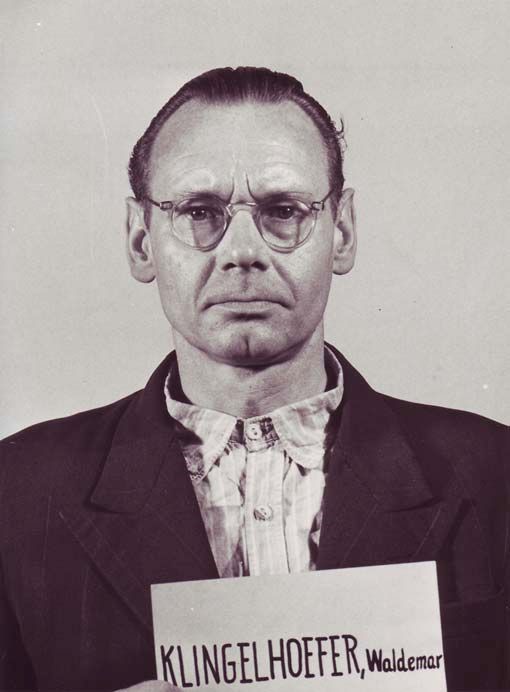
Woldemar Klingelhöfer as a defendant during the Einsatzgruppen process. Source: U.S. National Archives
Imprisonment and release
During his imprisonment in Landsberg, Klingelhöfer had returned to the Evangelical church in November 1948. He would have regretted his retirement in 1937 as a wrong decision. In prison he regularly participated in religious services, also performing as a singer. According to a prison preacher, he was an enemy "of every injustice," "a man like us today within our people, in which there is so much corruption, so badly needed for rehabilitation and edification. The positive words of this clergyman show that Klingelhöfer had two faces: that of the Holocaust perpetrator and that of the good citizen. Had the Third Reich never existed, he might have become a singing teacher or theater director. However, Klingelhöfer was an inspired Nazi, who did not become involved in the Holocaust by chance or powerlessness, but reaped what he himself had sowed. He had already joined the NSDAP before the Nazi takeover, translated an anti-Semitic book, had an immaculate and promising career within the SD, and at no time before the end of the war did he seem to have distanced himself from National Socialism. The road from the concert hall to the 'killing fields' of the Eastern Front was therefore not as improbable as it seems at first sight.
Deceased
After his release Klingelhöfer lived in Villingen. According to the information on his death certificate, he worked there as a commercial assistant (kaufmännischer Angestellter) and remarried on an unspecified date to a woman whose maiden name was Heinert. It is unknown whether he divorced his first wife or whether she had died. On the early evening of 18 January 1977 he died at the age of 76 in the town hospital of Villingen-Schwenningen.
Definitielijst
- Alpenfestung
- Fortification in the Alps. The first development spotted by the Americans in 1944. The Americans feared a stronghold in the Alps as a last resort of the Nazis. The plan was covered in mystery. On the one hand the Alpenfestung might be the last SS stronghold which could lead to defeat of the Allied forces. Enormous arms depots were built and Nazi elite troops would be able to hide everywhere in the Alps and cause death and despair behind enemy lines, sometimes even in allied uniforms. This terrifying development was fed by German propaganda trying to lure the American forces towards the Alps and away from the Rhine. Although the British warned against this, the Americans decided to divide their forces and had them advance towards Berlin as well as the south. The Alpenfestung turned out, however, to be nothing but a spectre.
- capitulation
- Agreement between fighting parties concerning the surrender of a country or an army.
- communism
- Political ideology originating from the work of Karl Marx “Das Kapital” written in 1848 as a reaction to the so-called class struggle between the proletariat (labourers) and the bourgeoisie. According to Marx the proletariat would take over power from the well-to-do classes though a revolution. The communist movement aspires an ideal situation where the means of production and the means of consumption are common property of all citizens. This should end poverty and inequality (communis = common).
- crimes against humanity
- Term that was introduced during the Nuremburg Trials. Crimes against humanity are inhuman treatment against civilian population and persecution on the basis of race or political or religious beliefs.
- Einsatzgruppen
- "Taskforces of Deployment Squads". Special units composed of various SS and police services under supervision of the Reichssicherheitshauptamt (RSHA). Einsatzgruppen were deployed during the invasion of Poland in 1939 and during operation Barbarossa in 1941. In 1939 these units were ordered to eliminate the Polish intelligentsia. In the Soviet Union they were deployed to execute various political and racial enemies of the Third Reich, like Jews, gypsies and communists. The "Holocaust by bullets" in the Soviet Union was the horrendous first act of the eventual "final solution".
- Führer
- German word for leader. During his reign of power Adolf Hitler was Führer of Nazi Germany.
- ghetto
- Part of a town separated from the outside world to segregate Jewish population. The establishment of ghettos was intended to exclude the Jews from daily life and from the rest of the people. From these ghettos it was also easier to deport the Jews to the concentration and extermination camps. Also known as “Judenviertel” or Jewish quarter.
- Holocaust
- Term for the destruction of European Jewry by the Nazis. Holokauston is the Greek term for a completely burnt sacrifice.
- Jews
- Middle Eastern people with own religion that lived in Palestine. They distinguished themselves by their strong monotheism and the strict observance of the Law and tradition. During World War 2 the Jewish people were ruthlessly persecuted and annihilated by the German Nazis. . An estimated 6,000,000 Jews were exterminated.
- mine
- An object filled with explosives, equipped with detonator which is activated by either remote control or by colliding with the targeted object. Mines are intended to destroy of damage vehicles, aircrafts or vessels, or to injure, kill or otherwise putting staff out of action. It is also possible to deny enemy access of a specific area by laying mines.
- National Socialism
- A political ideology drawn up by Hitler based on the superiority of the German race, the leader principle and fierce nationalism that was fed by the hard Peace of Versailles. National socialism was anti-democratic and racist. The doctrine was elaborated in Mein Kampf and organised in the NSDAP. From 1933 to 1945 National socialism was the basis of totalitarian Germany.
- Nazi
- Abbreviation of a national socialist.
- resistance
- Resistance against the enemy. Often also with armed resources.
- Socialism
- Political ideology aiming at slight or no class differences. Means of production are owned by the state. Evolved as a response to capitalism. Karl Marx tried to substantiate socialism scientific.
- war crimes
- Crimes committed in wartime. Often concerning crimes committed by soldiers against civilians.
Information
- Article by:
- Kevin Prenger
- Translated by:
- Fernando Lynch
- Published on:
- 19-01-2025
- Feedback?
- Send it!
